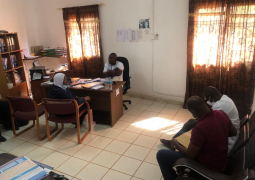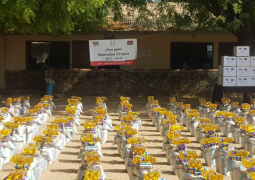
Here, children, with their small frames and hopeful eyes, navigate the chaotic landscape not as carefree playmates, but as street vendors, tasked with the weighty responsibility of contributing to their family's meager income. Their journey is not one of childhood adventures, but rather a daily battle against the harsh realities of poverty and survival.
Children selling on the streets in The Gambia face numerous challenges, including lack of access to education, exposure to exploitation and vulnerability to various dangers. It's a complex issue that often involves socio-economic factors and efforts to address it typically require a multi-faceted approach involving government policies, community initiatives and support from NGOs and international organisations.
Reports have shown that the legal working age of The Gambia is 16 years. For hazardous job, it is age 18. Yet, children often have to work to support their families’ income, and the government rarely conducts inspections. Boys in urban areas work as shoe-shiners or street-sweepers and some undertake more hazardous jobs, like hauling heavy objects, that could lead to future health problems.
On the other hand, girls commonly work in domestic service, or as street vendors selling fruit, water or candy. However, both girls and boys in rural areas work on farms. Children between the ages of 14 and 16 commonly work in physical-labour industries like lumbering, sewing, brick-making or masonry, often for exhausting hours is unethical and unsafe.
In a recent interview conducted by The Point, Aminata Coker, an entrepreneur conveyed her heartfelt feeling, expressing a poignant perspective on the plight of children.
She passionately articulated her conviction that the most appropriate environment for children is within the walls of educational institutions, where they can receive the guidance and knowledge necessary to thrive.
Furthermore, she underscored the critical importance of nurturing, loving homes, emphasising that it is within these supportive environments that children can truly flourish and reach their full potential.
Coker's poignant words serve as a powerful call to action, urging society to prioritize the well-being and future of its youngest members."
Michelle Famo Mendy, a senior mistress at St Therese's lower Basic school lamented that children shouldn't have to sell on the streets, as it exposes them to dangers like theft, drug abuse, and even worse.
‘Without education, their future looks bleak; girls might end up in prostitution, and boys in crime.’
She called on parents to prioritise their children’s education and safety to break this cycle of exploitation and give them a chance for a better life.
A 14-year-old girl namewithheld selling bananas at Westfield, expressed her desire to attend school. However, she explained that she had no choice as her father passed away early last year, and her mother is disabled.
She is responsible for taking care of her mother along with her younger brother.
Mrs. Mariama Cham, a social worker, child rights activist, and mental health specialist, emphasised the need for children to be enrolled in school as it is their fundamental human right.
“When children engage in street vending, they face numerous risks, including abuse and harassment, which deeply affect them mentally, physically, and emotionally. Involving children in monetary activities below the age of 18 is prohibited by the laws of The Gambia under the Children Amendment Act of 2016, as well as other international laws.” Mrs Cham said.
She indicated that it is imperative that children should protected, and the government holds the primary responsibility to employ measures to ensure their safety.
Read Other Articles In National News

Gambian US-based philanthropist gives books to Methodist Schools
Feb 12, 2025, 11:33 AM




